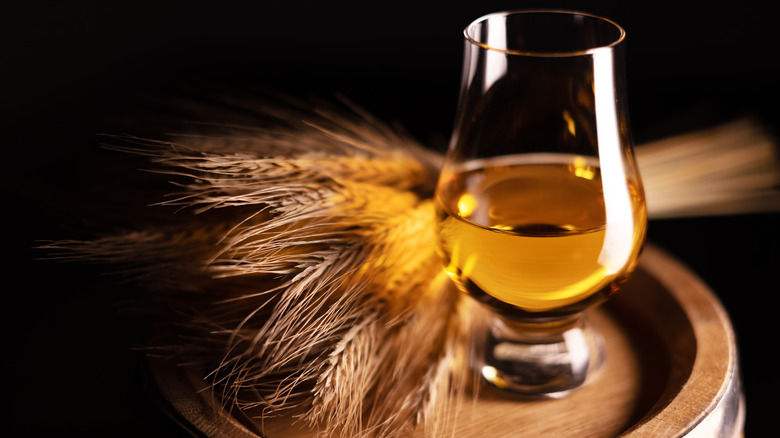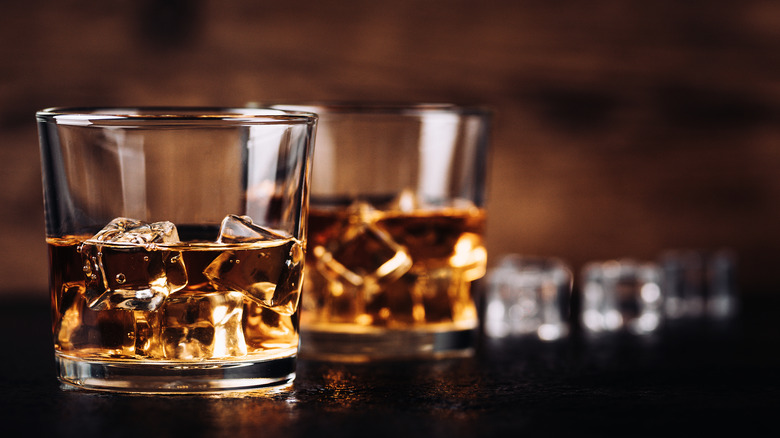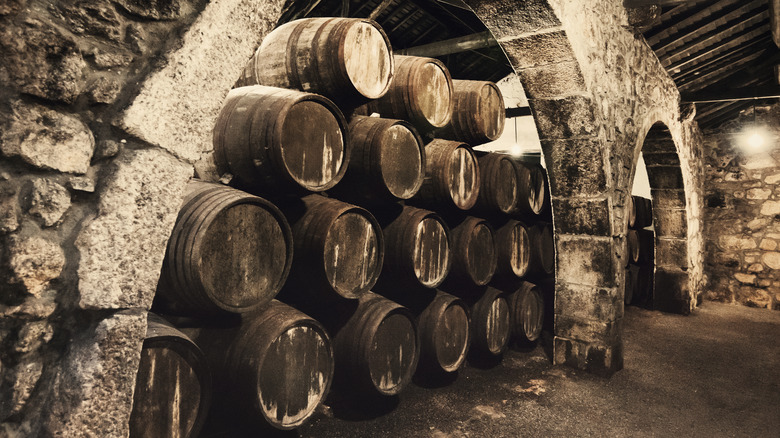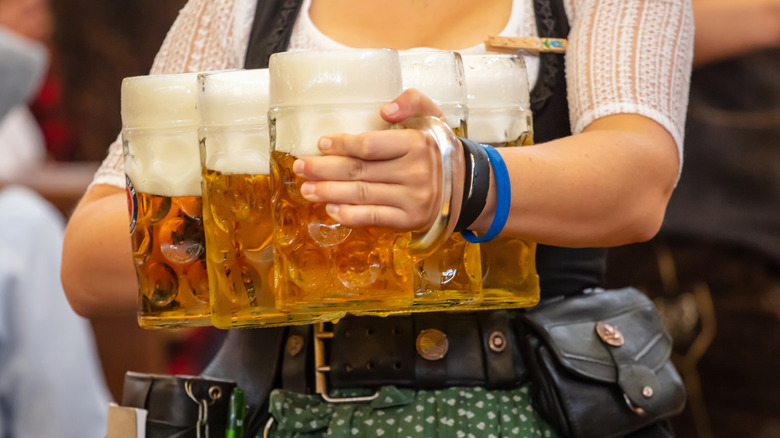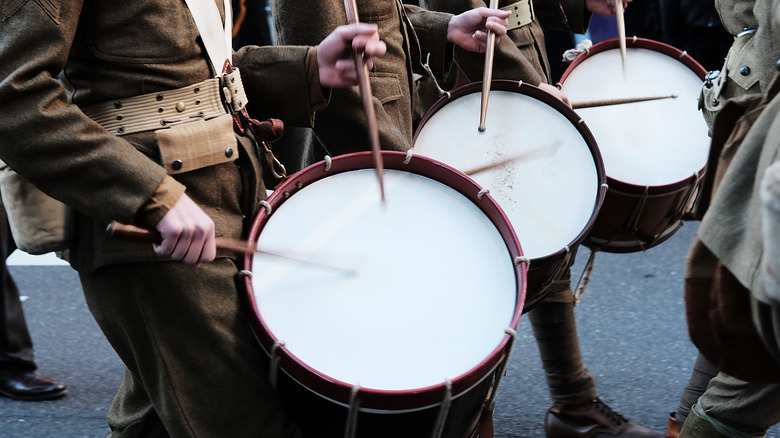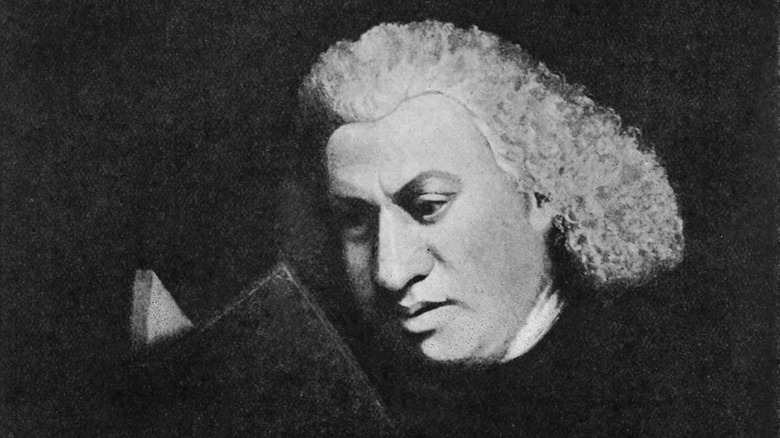The Mysterious Origins Of The Word Booze
Moonshine, hooch, firewater, giggle juice — these are just a few of the many nicknames we give our alcoholic beverage of choice (via American Addiction Centers). That's not to mention the estimated 3,000 words the English language has for getting drunk, according to the BBC. One of the most common slang terms for alcohol is booze, but where does that word really come from? To examine the origins of the word booze is like a trip back through American history, including common European immigration patterns to the U.S., the development of the English language, and the history of alcohol consumption itself in North America. One theory about the origin of the word even includes one of the 20th century's biggest conflicts, World War I.
Regardless of which of these you believe, or which one might actually be true, the history of the word booze makes for good trivia. Or instead, these might just be good stories for your bartender and friends the next time you hold court from your barstool.
The American distiller E.G. Booz
The first theory about where the word booze comes from tells of a real-life early 19th-century American distiller named — appropriately enough — Edmund Booz. Per American Whiskey Trail, whiskey making was one of the first industries to take root in the colonies, and Edmund Booz was a professional whiskey maker and retailer in the Philadelphia area. His log-cabin-shaped bottles, stamped with "E.G. Booz," are some of the most collectible glass bottles in the trade, as Antique Bottles reports.
A famous whiskey distiller in the early days of the industry also named Booz? That's quite a coincidence. With that, the case for the origin of the word booze seems to be closed. Turns out, though, the mystery deepens. That's because some 500 years before Edmund Booz was alive, there was another word very similar to booze in common usage back in England. The word was also nearly interchangeable to how we use the word booze today.
It might be Middle English
The next possible explanation for where the word booze comes from is Middle English, which was spoken in medieval England from around 1100 to about 1500, according to Britannica. The word in question didn't start out directly related to alcohol or getting drunk. But the word certainly sound and looks a lot like booze, and what the word once meant certainly ties it to our modern-day usage of booze. Because what do you do with booze, after all? You drink it.
The Middle English word that some scholars point toward as the origin of booze is bouse, meaning to drink, and the word bouse began to mean alcoholic beverage as far back as the 14th century, according to Mental Floss. Our spelling of booze showed up about 300 years later, also predating Mr. Booz. The origins of most any English word, though, don't begin with English at all, and the same is true of the word bouse.
Or possibly Old High German
Tracing the origin of bouse takes us even further back in time, to Old High German. Many English words from any period started out in this version of the German language, closely related to modern-day English, and spoken from around A.D. 750 to about A.D. 1050, as German Culture reports. There's one Old High German word in particular that might be the true origin of bouse, and therefore, our modern day "booze," according to Mental Floss.
The Old High German word that is commonly believed to be etymologically linked to the word bouse, and then booze, is bausen, meaning to bulge or to billow, which sounds a lot like how drinking too much sometimes feels like. So far, we've traced the linguistic lineage of the word booze back more than 1,000 years. There's one other theory about where the word came from, though, that occurred much closer in history, this time in France.
Is it from World War I, after all?
Per Booze Business, one other possible explanation for where the word booze really comes from happened much more recently than the Middle Ages. The word instead could come from World War I, a terrible slog that American troops — also called "doughboys" — fought in from 1917 until the war ended in 1918, according to History. Given the conditions endured by soldiers fighting in World War I, it's natural that soldiers might want a drink. When doughboys found themselves in Buzet, France — which is wine country, according to Wine Tourism — they said bottoms up and the word booze was born, as English-speaking doughboys drank their fill.
From there, American soldiers brought the word booze back home with them when the war ended, according to Booze Business. Could booze be what it sounded like American infantry were saying when they tried to pronounce Buzet? We'll likely never know. Other similar words to booze were in usage much longer ago than 1918, meaning the World War I theory, though entertaining, is probably not true after all.
It's probably Dutch
And with that, we return to the possible etymological origin of the word booze, and even though nobody knows for sure exactly where the word came from — and even though there's also an old Persian-Turkish word, boza, meaning alcohol, according to HuffPost — this explanation is likely the definitive answer in most scholars' opinion, according to Mental Floss. As well as the Old High German word bausen or bauschen, Dutch also has several similar words meaning similar things, such as buise, or something from which you can drink, or búsen, which meant to drink too much, to drink excessively, or to get drunk.
This may also explains why 18th-century English linguist, scholar, and writer Samuel Johnson (via Britannica) used bouse as a verb — "to bouse" meaning to drink too much, but also bousy for drunk, or a bousing can meaning a cup (via Mental Floss). (Johnson is pictured above). Remember that the next time you (responsibly) enjoy a little booze with some friends after work.
